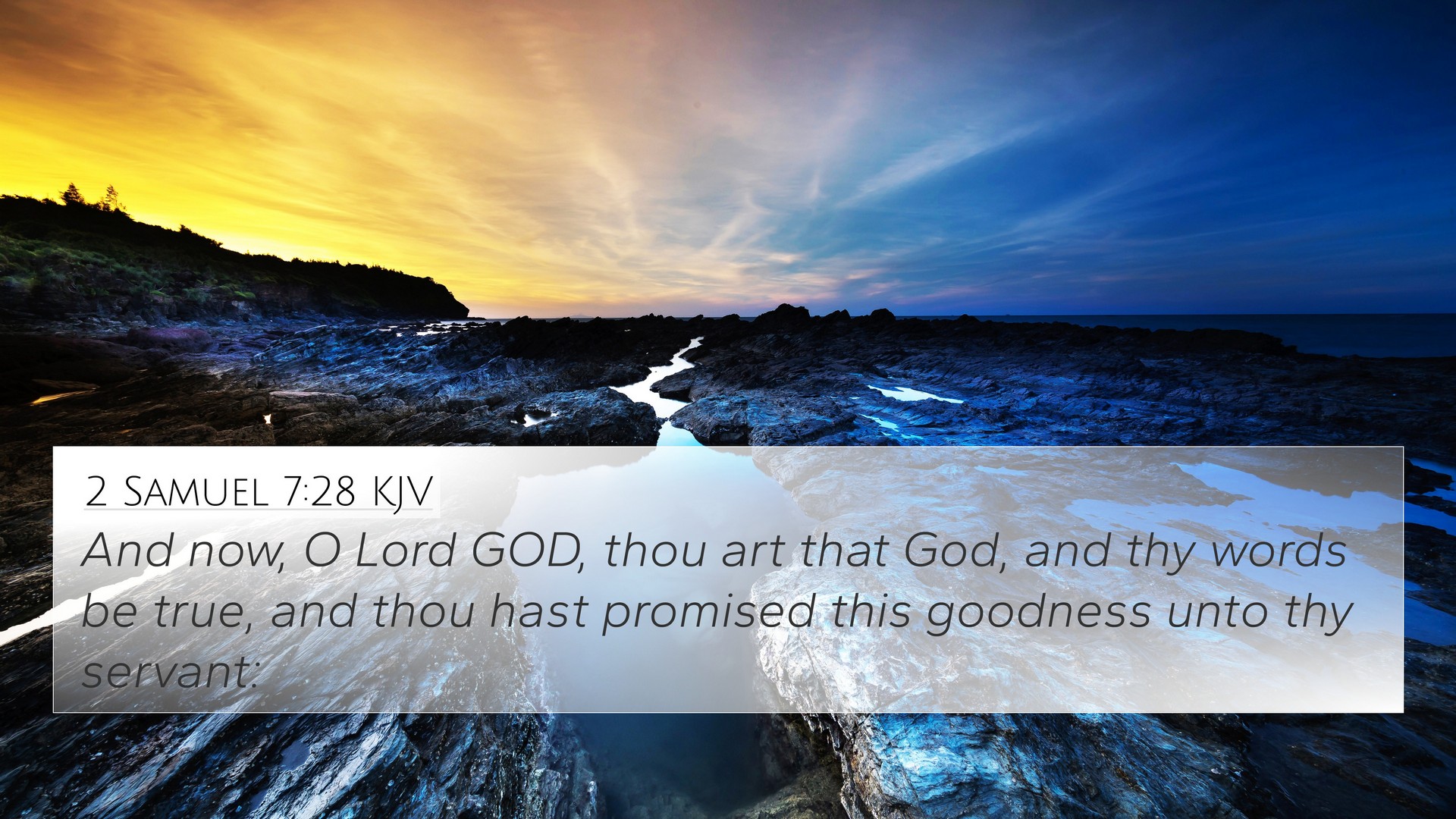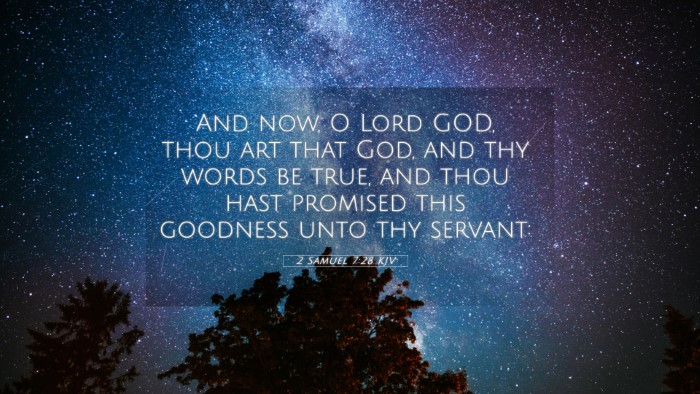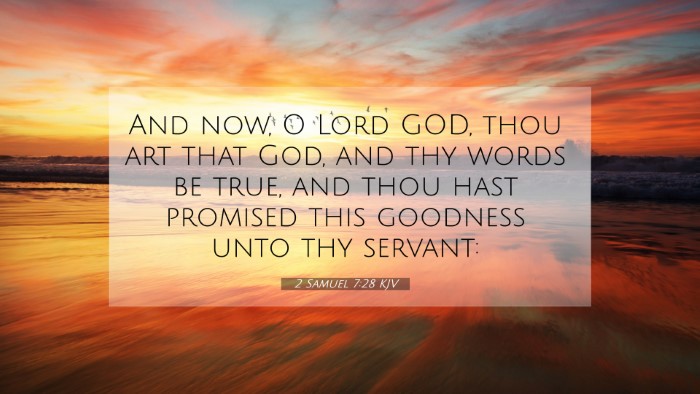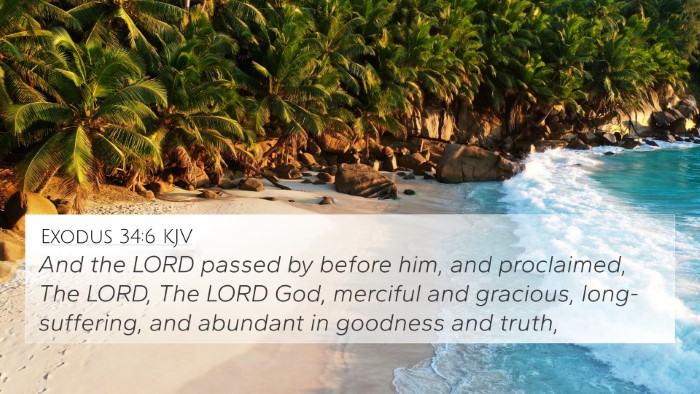Understanding 2 Samuel 7:28
Verse: "And now, O Lord God, thou art that God, and thy words be true, and thou hast promised this goodness unto thy servant." (2 Samuel 7:28)
Summary of 2 Samuel 7:28
This verse articulates King David's acknowledgment of God's sovereignty and faithfulness to His promises. It reflects a deep understanding of God's nature and the reliance on His word as a foundation for trust and hope.
Insights from Public Domain Commentaries
-
Matthew Henry’s Commentary:
Henry emphasizes the importance of recognizing God's promises as immutable and dependable. David's declaration shows humility and a relational aspect of faith where one acknowledges their servitude to God. It signifies the pain of human limitations contrasted with God’s infinite capability.
-
Albert Barnes’s Notes:
Barnes points out that David acknowledges God’s divine attributes, such as truthfulness and goodness, highlighting the graciousness of God's promises to him. It underscores the essence of prayer that balances praise for God’s nature while seeking understanding of His plans.
-
Adam Clarke’s Commentary:
Clarke delves into the relational dynamics between God and David, illustrating how this verse reflects a covenant relationship. He mentions that recognizing God’s grace leads to a deeper understanding of His purpose in our lives.
Key Themes
Several key themes emerge from 2 Samuel 7:28:
- Divine Sovereignty: The acknowledgement of God as the Almighty reinforces His supreme authority.
- Faithfulness of God: Emphasis is placed on God’s promises being true, grounding the believer’s hope.
- Human Response: David’s reply showcases the humility and reverence expected from believers.
Cross-References
This verse connects powerfully with the following scriptures:
- Psalm 119:160 - "Thy word is true from the beginning: and every one of thy righteous judgments endureth forever." - Illustrating the permanence and truth of God’s word.
- Romans 4:21 - "And being fully persuaded that, what he had promised, he was able also to perform." - Highlighting God's ability to fulfill His promises.
- Hebrews 10:23 - "Let us hold fast the profession of our faith without wavering; (for he is faithful that promised;)" - Describing the commitment to faith based on God’s faithfulness.
- 2 Peter 3:9 - "The Lord is not slack concerning his promise, as some men count slackness; but is longsuffering to us-ward, not willing that any should perish..." - God’s promise of salvation elaborated.
- Isaiah 55:11 - "So shall my word be that goeth forth out of my mouth: it shall not return unto me void..." - The assurance of God's unchangeable nature related to His spoken word.
- Genesis 15:6 - "And he believed in the LORD; and he counted it to him for righteousness." - A testament of faith exemplified in the relationship with God.
- Philippians 1:6 - "Being confident of this very thing, that he which hath begun a good work in you will perform it until the day of Jesus Christ:" - Affirmation of God’s ongoing work in believers.
Connections Between Bible Verses
Understanding 2 Samuel 7:28 leads us to explore the connections between various Biblical texts. When we delve deeper into the thematic links among scriptures, it becomes evident that:
- There is a recurring theme of trust in God's righteousness throughout the Old and New Testaments.
- The parallels between David's acknowledgment of God's covenant and New Testament teachings of grace offer profound insights into God’s nature.
- Looking at the cross-references, we see consistency in the message of God's fidelity and how it calls believers to a response of faith.
Tools for Bible Cross-Referencing
To further enrich your study of biblical texts, consider utilizing various tools and resources:
- Bible Concordance: Helps in locating specific verses and similar themes throughout the scripture.
- Bible Cross-Reference Guide: A structured approach that can lead you to related scriptures for deeper understanding.
- Cross-Reference Bible Study: Techniques that enhance your ability to draw connections between various passages.
- Bible Chain References: A method to connect verses in a sequence to illustrate a continuous theme or teaching.
Conclusion
2 Samuel 7:28 serves as a cornerstone verse that illustrates the significance of recognizing God's promises and His faithful character. By engaging in scriptural cross-referencing, believers can enrich their understanding and discover deeper connections between the messages presented throughout the Bible. This approach not only enhances personal faith but fosters a more comprehensive grasp of God's divine narrative.






